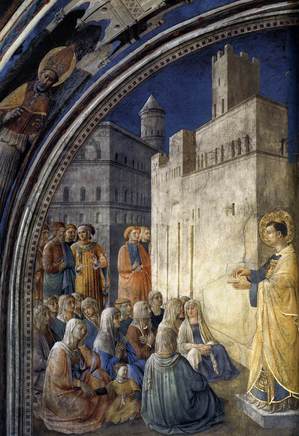 In the blood of the holy Levite Stephen "the Church dedicates the first-fruits of martyrdom" to the King of martyrs.
In the blood of the holy Levite Stephen "the Church dedicates the first-fruits of martyrdom" to the King of martyrs.The day following Christmas, December 26, is observed liturgically by the Church as Saint Stephen's Day. Saint Stephen's feast is located so close to Christmas because of his very close connection with the Lord. Stephen is the first martyr --the protomartyr-- of the New Testament (See Acts 6-7).
Today in 2010, the liturgical observance of Sunday is maintained as the Lord's Day and is not trumped by a saint's feast. The overlaying of the Holy Family feast today --observed on the Sunday following Christmas-- doesn't replace the Sunday observance nor the Scripture readings but today is the feast of the Holy Family and it is a rich feast nonetheless. But we don't forget Saint Stephen!
The Polish children would imitate the stoning of Stephen by throwing walnuts at each other. In agricultural countries horses and horse food (hay and oats, and salt) are blessed. In the UK, Saint Stephen's day is also known as "boxing day" because priests in medieval times they gave alms collected in Church to the poor. All shared in the Lord's blessings. This charitable gesture of the priests was adopted by the laity who also gave alms to the poor. What you see here is the beauty of the gospel preached by Jesus and the Apostles realized in concrete ways. Money is counted and given freely, hence the breaking of the alms boxes became known as "boxing day" because it was an invitation to be mindful of the less fortunate. German children had piggy banks made of clay taking on the same sensibility as the British children knew. The Germans sometimes call today the "pig's feast" because the clay pig bank was broken to gain access to the monetary savings to be given to others in need.
Since the saints always and unreservedly point to Christ, theologically we'd say that the Christ Child, the Divine Child, gave His blessings. Latin Americans would call the infant Jesus as "el Niño Jesús" or the Germanic peoples would call Him the "Christkind" or the diminutive "Christkindel" (and you see the origins of the word Kris Kringle and Santa Claus).
Whether the customs of the UK or Germanic countries prevail, the connection to Saint Stephen is maintained: as a deacon of the nascent Church, Stephen cared for the widow, the orphan, the outcast --the needy. Indeed, deacons looked after the temporal needs of all people, and he preached Jesus' Good News of Salvation. The gesture of giving is form of witness to the abundant blessings of God, it is also a sermon not in words, but in concrete actions. The diakonia of Saint Stephen is recognized in the medium of giving away what one has received for the well-being of another. So, today is traditional days to honor those ordained to the Order of Deacon.


Leave a comment